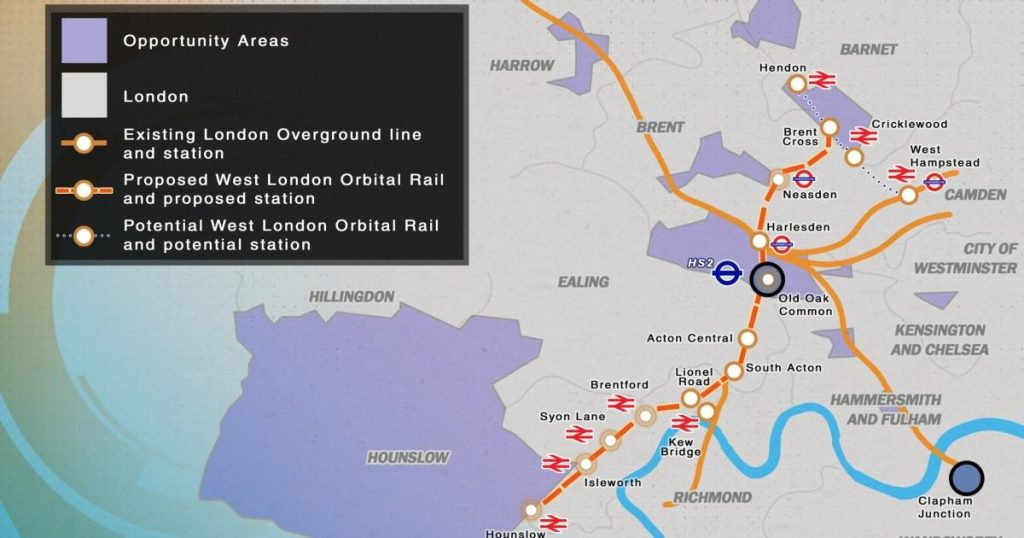The West London Orbital: A Proposed Overground Extension Connecting Five Boroughs
Transport for London (TfL) has proposed a significant expansion of the London Overground network, known as the West London Orbital. This ambitious project aims to connect five boroughs in west and northwest London – Camden, Barnet, Brent, Ealing, and Hounslow – utilizing existing railway lines. The primary objective is to improve connectivity within these outer London boroughs, reducing reliance on journeys through central London and facilitating easier access to tens of thousands of homes and employment opportunities. Estimated to cost between £430 million and £610 million (based on 2021 figures), the West London Orbital would link key locations such as Hendon, Brent Cross, and West Hampstead in the northwest with Hounslow in the west, passing through the strategically important Old Oak Common HS2 station, Harlsden, and Acton. This new route promises to significantly alter commuting patterns and potentially stimulate economic growth in the connected areas.
Mayor’s Support and Funding Challenges
Mayor of London Sadiq Khan has identified the West London Orbital as a priority project, indicating that the current development phase is nearing completion. However, the realization of this project hinges on securing funding from various sources, including local authorities, the central government, TfL, and the Greater London Authority. The complex funding landscape presents a significant hurdle, and collaboration between these stakeholders will be crucial to securing the necessary resources. Successfully navigating this financial challenge will determine the timeline for the project, which is currently projected for completion by the early 2030s.
Mixed Reactions from Local Communities and Businesses
While the proposed Overground extension promises improved connectivity and potential economic benefits, local reactions have been mixed. Some residents and business owners near proposed station locations expressed both enthusiasm and apprehension about the project’s impact. Some commuters, particularly those travelling between west and northwest London, welcomed the prospect of a more direct route, eliminating the need to travel through central London. Others, however, expressed concerns about potential disruptions, increased congestion, and the impact on existing businesses.
Optimism for Improved Connectivity and Economic Growth
Several individuals expressed optimism about the potential benefits of the West London Orbital. They highlighted the improved connectivity it would offer, particularly for those travelling between the connected boroughs, and the potential for economic growth in the areas served by the new line. The prospect of easier access to employment opportunities, leisure activities, and other services was seen as a positive development for residents and businesses alike. The enhanced transport links could also attract investment and stimulate economic activity in the surrounding areas, leading to job creation and improved local amenities.
Concerns about Business Impacts and Existing Infrastructure
Despite the potential benefits, some local businesses expressed concerns about the potential negative impacts of the new Overground line. One business owner, for example, feared that a new station near his establishment could divert customers away, citing a previous experience with the opening of Brent Cross West station. These concerns highlight the importance of carefully considering the potential impacts on existing businesses and implementing mitigation strategies to minimize any negative consequences. Furthermore, the project raises questions about the existing railway infrastructure’s capacity to accommodate the increased traffic and the potential need for upgrades or expansions to ensure smooth operation.
Balancing the Benefits and Addressing Local Concerns
The West London Orbital presents a significant opportunity to improve transport connectivity and stimulate economic growth in west and northwest London. However, the project also faces challenges, including securing funding and addressing concerns from local communities and businesses. Successfully navigating these challenges will require careful planning, effective communication with stakeholders, and a commitment to mitigating any potential negative impacts. Balancing the potential benefits of improved connectivity with the need to address local concerns will be crucial to ensuring the project’s success and maximizing its positive impact on the communities it serves.


